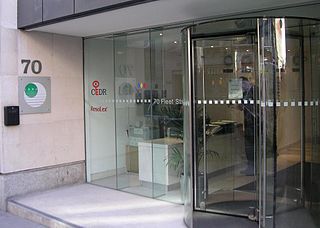Related Research Articles

An injunction is a legal and equitable remedy in the form of a special court order that compels a party to do or refrain from specific acts. "When a court employs the extraordinary remedy of injunction, it directs the conduct of a party, and does so with the backing of its full coercive powers." A party that fails to comply with an injunction faces criminal or civil penalties, including possible monetary sanctions and even imprisonment. They can also be charged with contempt of court. Counterinjunctions are injunctions that stop or reverse the enforcement of another injunction.
A writ of prohibition is a writ directing a subordinate to stop doing something the law prohibits. This writ is often issued by a superior court to the lower court directing it not to proceed with a case which does not fall under its jurisdiction.
Forum non conveniens (FNC) is a mostly common law legal doctrine through which a court acknowledges that another forum or court where the case might have been brought is a more appropriate venue for a legal case, and transfers the case to such a forum. A change of venue might be ordered, for example, to transfer a case to a jurisdiction within which an accident or incident underlying the litigation occurred and where all the witnesses reside.

A forum selection clause in a contract with a conflict of laws element allows the parties to agree that any disputes relating to that contract will be resolved in a specific forum. They usually operate in conjunction with a choice of law clause which determines the proper law of the relevant contract.
The doctrine and rules of state immunity concern the protection which a state is given from being sued in the courts of other states. The rules relate to legal proceedings in the courts of another state, not in a state's own courts. The rules developed at a time when it was thought to be an infringement of a state's sovereignty to bring proceedings against it or its officials in a foreign country.
In law, the enforcement of foreign judgments is the recognition and enforcement in one jurisdiction of judgments rendered in another ("foreign") jurisdiction. Foreign judgments may be recognized based on bilateral or multilateral treaties or understandings, or unilaterally without an express international agreement.

The Brussels Regime is a set of rules regulating which courts have jurisdiction in legal disputes of a civil or commercial nature between individuals resident in different member states of the European Union (EU) and the European Free Trade Association (EFTA). It has detailed rules assigning jurisdiction for the dispute to be heard and governs the recognition and enforcement of foreign judgments.
The principle of lis alibi pendens applies both in municipal law, public international law, and private international law to address the problem of potentially contradictory judgments. If two courts were to hear the same dispute, it is possible they would reach inconsistent decisions. To avoid the problem, there are two rules.
An arbitration award is a determination on the merits by an arbitration tribunal in an arbitration, and is analogous to a judgment in a court of law. It is referred to as an 'award' even where all of the claimant's claims fail, or the award is of a non-monetary nature.
Asset freezing is a legal process which prevents a defendant whether innocent or guilty to an action from dissipating their assets from beyond the jurisdiction of a court so as to frustrate a potential judgment. It is widely recognised in other common law jurisdictions and such orders can be made to have world-wide effect. It is variously construed as part of a court's inherent jurisdiction to restrain breaches of its process.

Arbitration, a form of alternative dispute resolution (ADR), is a way to resolve disputes outside the judiciary courts. The dispute will be decided by one or more persons, which renders the 'arbitration award'. An arbitration decision or award is legally binding on both sides and enforceable in the courts, unless all parties stipulate that the arbitration process and decision are non-binding.

An arbitral tribunal or arbitration tribunal, also arbitration commission, arbitration committee or arbitration council is a panel of unbiased adjudicators which is convened and sits to resolve a dispute by way of arbitration. The tribunal may consist of a sole arbitrator, or there may be two or more arbitrators, which might include a chairperson or an umpire. Members selected to serve on a arbitration panel are typically professionals with expertise in both law and in friendly dispute resolution (mediation). Some scholars have suggested that the ideal composition of an arbitration commission should include at least also one professional in the field of the disputed situation, in cases that involve questions of asset or damages valuation for instance an economist.
A preliminary ruling is a decision of the European Court of Justice (ECJ) on the interpretation of European Union law, given in response to a request from a court or tribunal of a European Union Member State. A preliminary ruling is a final determination of EU law, with no scope for appeal. The ECJ hands down its decision to the referring court, which is then obliged to implement the ruling.

Justice Jean-Paul Beraudo is a lawyer, academic and author of legal works. He was Justice at the French Supreme Court and Vice-Chairman of the International Court of Arbitration. He lectures on International Private Law and International Trade Law at Panthéon-Sorbonne University and on Company law at Sciences-Po, Paris. The International Institute for the Unification of Private Law (UNIDROIT) appointed him correspondent for France and a member of the scientific committee.
Investor-state dispute settlement (ISDS) or investment court system (ICS) is a system through which investors can sue countries for discriminatory practices concerning foreign direct investment. The purpose of the ISDS is to benefit the countries that voluntarily adhere to it; these countries benefit because foreign investors are motivated to invest under the protection that ISDS affords.

The Anti-Injunction Act, is a United States federal statute that restricts a federal court's authority to issue an injunction against ongoing state court proceedings, subject to three enumerated exceptions. It states:
Microsoft Corp. v. Motorola Inc., 696 F.3d 872 was a United States Court of Appeals for the Ninth Circuit case about Reasonable and Non-Discriminatory (RAND) Licensing and foreign anti-suit injunction.

Philippines v. China, also known as the South China Sea Arbitration, was an arbitration case brought by the Republic of the Philippines against the People's Republic of China (PRC) under Annex VII to the United Nations Convention on the Law of the Sea concerning certain issues in the South China Sea, including the nine-dash line introduced by the Republic of China (Taiwan) since as early as 1947. A tribunal of arbitrators formed under the same annex appointed the Permanent Court of Arbitration (PCA) as the registry for the proceedings.
Allianz SpA v West Tankers is a preliminary ruling by Full Chamber the Court of Justice of the Court of Justice of the European Union upon a reference for a preliminary ruling from the House of Lords. The court held that the validity of arbitration agreements falls within the scope of the Brussels regulation, but that anti-suit injunction can not be given.

Société Nationale Industrielle Aérospatiale v Lee Kui Jak[1987] UKPC 12, [1987] AC 871 is a judicial decision of Privy Council on appeal from Brunei which was for many years, and arguably still is, the leading authority in relation to anti-suit injunctions under the English common law.
References
- ↑ Lévy, Laurent, "Anti-suit Injunctions Issued by Arbitrators", in Emmanuel Gaillard (ed.), Anti-Suit Injunctions In International Arbitration (Berne: Staempfli, 2005)
- ↑ Turner v Grovit (C-159/02) [2005] 1 AC 101
- ↑ Sebastiano Nessi, "Anti-suit and Anti-arbitration Injunctions in International Commercial Arbitration: The Swiss Approach", in SAA Series on International Arbitration, Vol. 3, Selected Papers on International Arbitration, Bern, Stämpfli, 2013
- ↑ Allianz SpA (formerly Riunione Adriatica di Sicurta SpA) v West Tankers Inc (C-185/07) [2009] 1 AC 1138